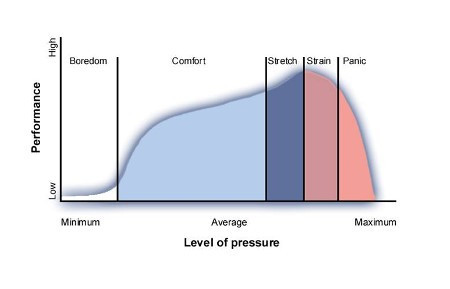What is stress?
The body responds to an emergency situation or threat by producing adrenaline, which prepares the body to flight or fight. This is a stress reaction – it is normal and natural. Although usually we do not have to fight for our lives, other everyday events, situations or stressors can cause a stress reaction.
These stressors may be different for each person and may even vary for an individual from time to time.
Stress is not a diagnosed medical illness. The symptoms of stress, which vary depending on the individual, can be physically and mentally debilitating. It is a reaction that people suffer when the pressures upon them exceed their ability to cope.
If stress isn’t managed well it could lead to an escalation of symptoms and the development of a diagnosed mental health condition, such as anxiety and depression.

Stress vs pressure
Situations or events beyond our control may be particularly stressful. However stress is not always a negative response – some people thrive on adrenaline and take up dangerous sports or demanding jobs.
Everyone is different.
There’s no doubt that resilience, the ability not only to survive but thrive under pressure, is a key ingredient for success.
Challenging situations can only become stressful if we interpret them as stressful. Threat or thrill? Excitement or fear? Stress or pressure? It can often be a choice (Source: Lane4)
Stress and pressure are two different things. We need pressure to enable us to function and perform well. When demands are high and possibly unreasonable, we may not feel we can adequately respond to these expectations.
We may feel out of control and overwhelmed. This is when we tend to experience stress responses. This may happen over a long period of time or in short bursts. Excessive levels of stress have been shown to lead to burnout, a state of complete mental and physical exhaustion.
What is Burnout?
Burnout is a syndrome that results from constant workplace stress that has not been successfully managed.
The World Health Organisation characterises burnout by three main symptoms:
- Lack of energy and exhaustion
- Increased mental distance and negative feelings from one's job,
- Lower professional efficacy
Tips for Managing Stress and Preventing Burnout
MIND
Talk about your Feelings: Keeping things to yourself can often worsen stress. Communicating how you're feeling can help others support you. If you feel comfortable, keep your line manager in the loop about how you are feeling, and maybe see if there is a way to lighten your load. If you don't feel comfortable talking to your team, remember you can get free confidential advice through the EAP phoneline. It is ok to ask for help.
Keep in Touch: Stress is easiest to cope with when you have supportive friends and family. Try to invest in these relationships and lean on them when you need to.
Accept Who You Are: Everyone reacts differently to situations. It's okay to spend time figuring out and accepting how you may react to things.
Don't forget to have a look through the Mental Wellbeing Journey page here.
BODY
Keep Active: Movement and exercise releases endorphins (the happy hormone) which help balance cortisol levels (the stress hormone). You can make use of the Aviva Get Active services, detailed on the physical wellbeing journey. Did you know that JLR has several sports teams and fitness groups? Get in touch with your local wellbeing champion to find out more.
Eat Well: Often when we are stressed, a balanced diet can be hard to keep up with. Your body and brain need a range of nutrients to function properly and support our stress levels. Don't forget that JLR employees have access to appointments with a Nutritionist via the Digicare+ app.
Drink Sensibly: Some people are tempted to use alcohol to improve their mood, but effect is only temporary. Make sure you keep within the recommended limits of 14 units per week. Find out more on the alcohol page.
Sleep Hygiene: It is important that we get 7-9 hours of sleep every night in order for our body to recuperate and wake up feeling ready for the day. Having a good night time routine can help you relax, such as switching off your phone an hour before bed or using the Thrive app.
LIFE
Take your lunch breaks: It can be tempting to eat lunch at your desk or skip it altogether to try and squeeze a bit more work in. Research has shown that not taking regular breaks actually worsens productivity, and your brain benefits far more from a change of scenery and a solid meal than non-stop work.
Use your Annual Leave: Alongside taking small regular breaks throughout your working day, make sure you plan to use your annual leave to give yourself a chance to fully step away from work. People experiencing burnout usually report a work/life imbalance, so it is really important to make sure you are looking after both sections of your life.
Disconnect: Outside of working hours, try to totally disconnect from work. If you aren't sure how to mute notifications, there is a how-to guide here.
Engage in your Hobbies: Taking part in something you enjoy and are good at can help to boost your self esteem and confidence. This can translate back into work, giving yourself the confidence to deal with challenging times.
If you’re struggling with your mental health, it’s important you seek some help from your GP. If it’s affecting your ability to work, speak to your manager to see if a referral to Occupational Health is appropriate. You can contact our EAP for free and confidential support 24/7, 365 days a year.